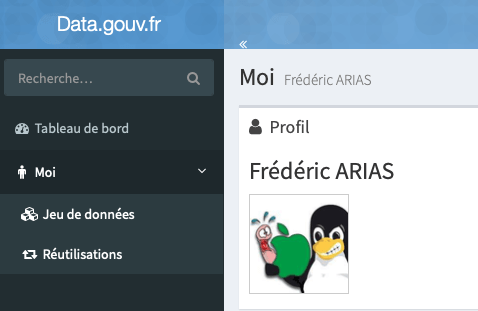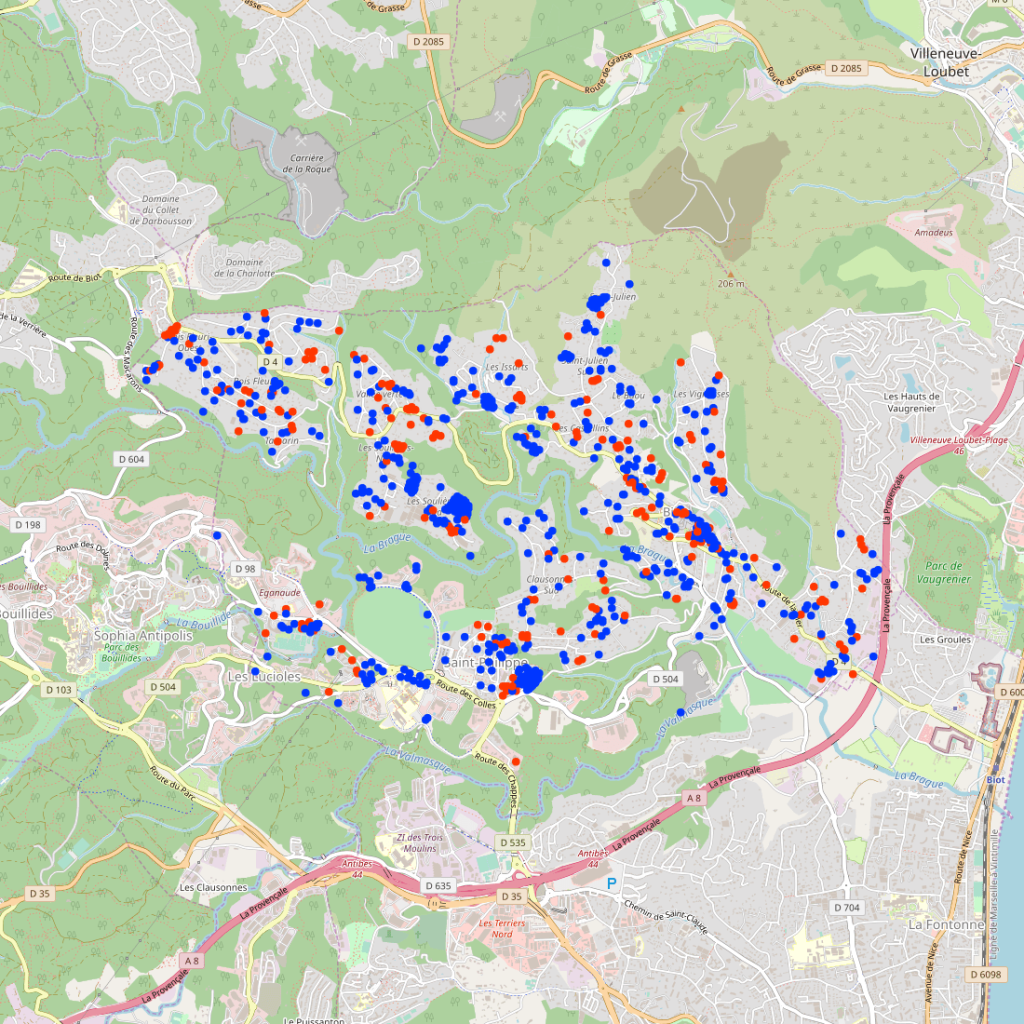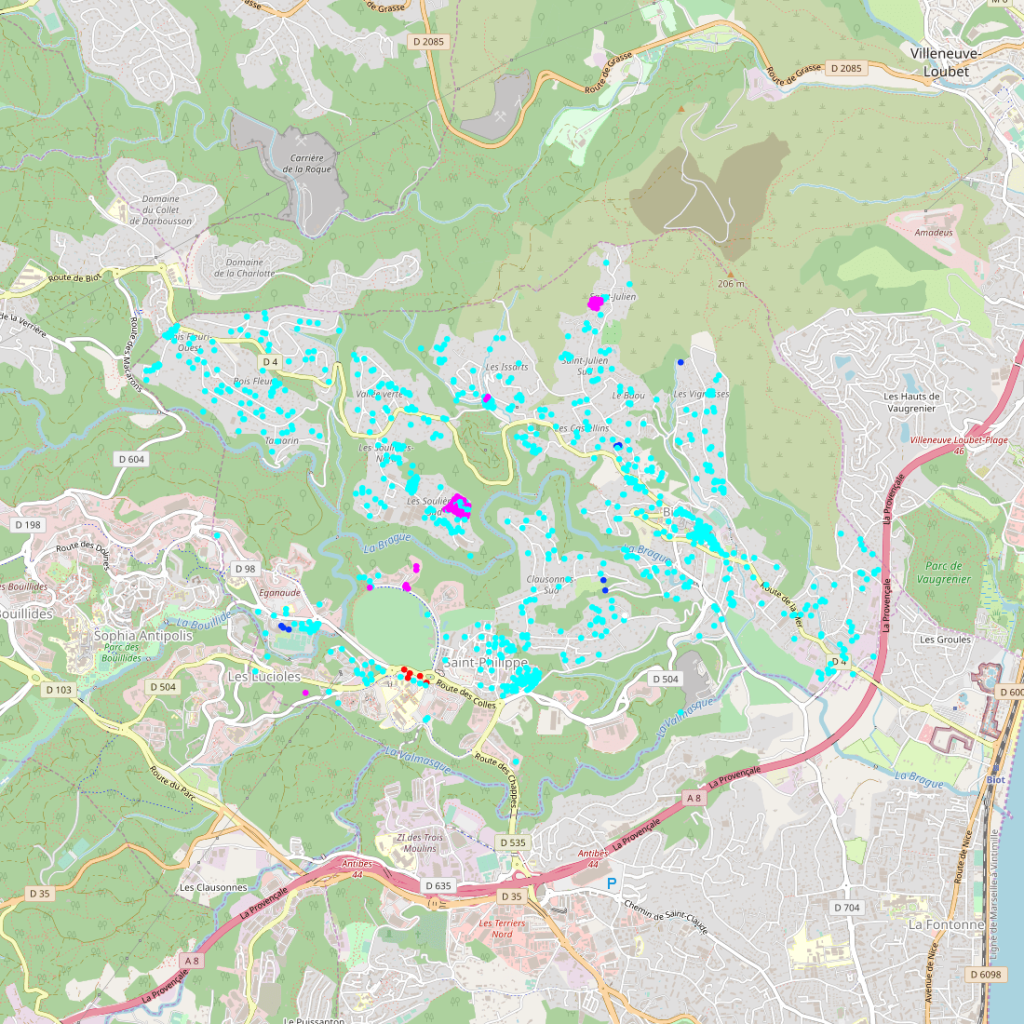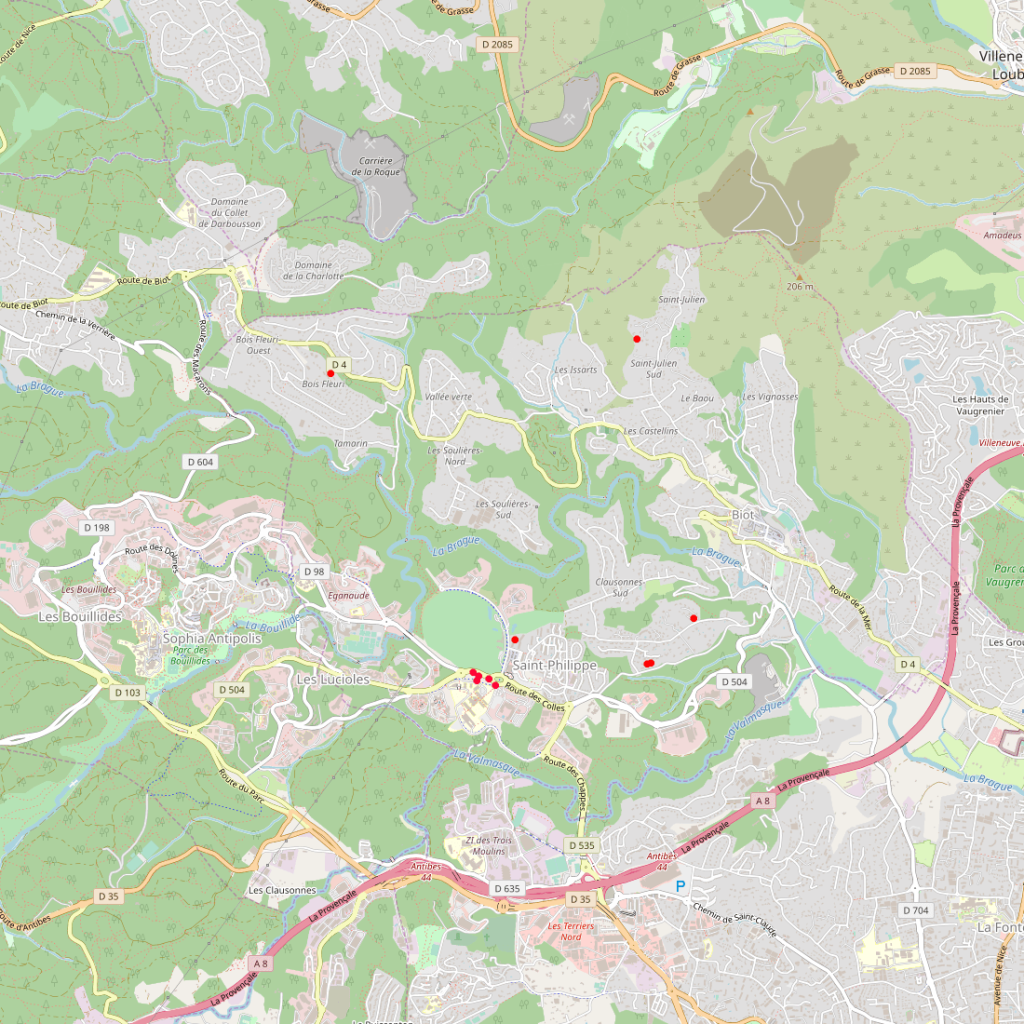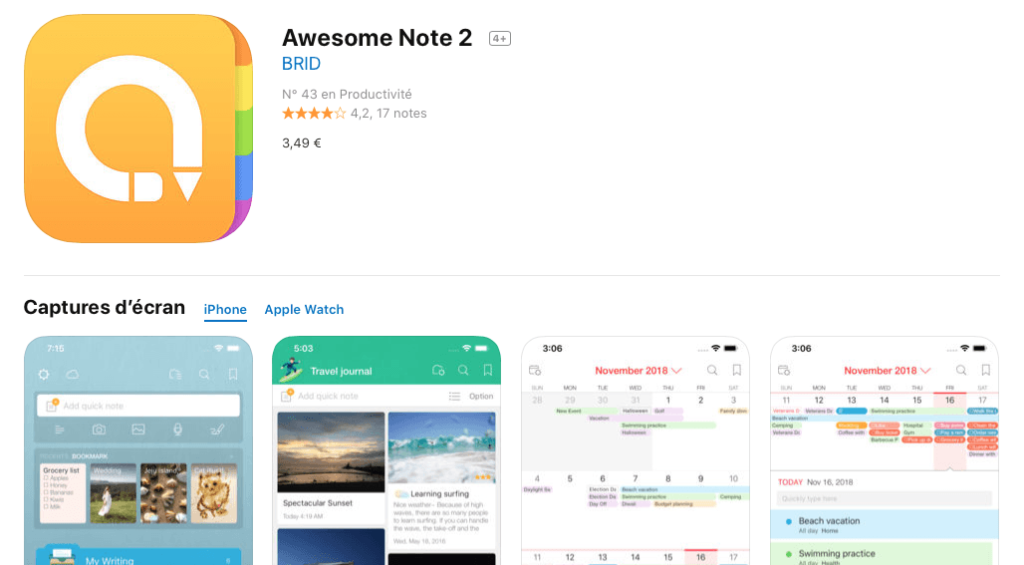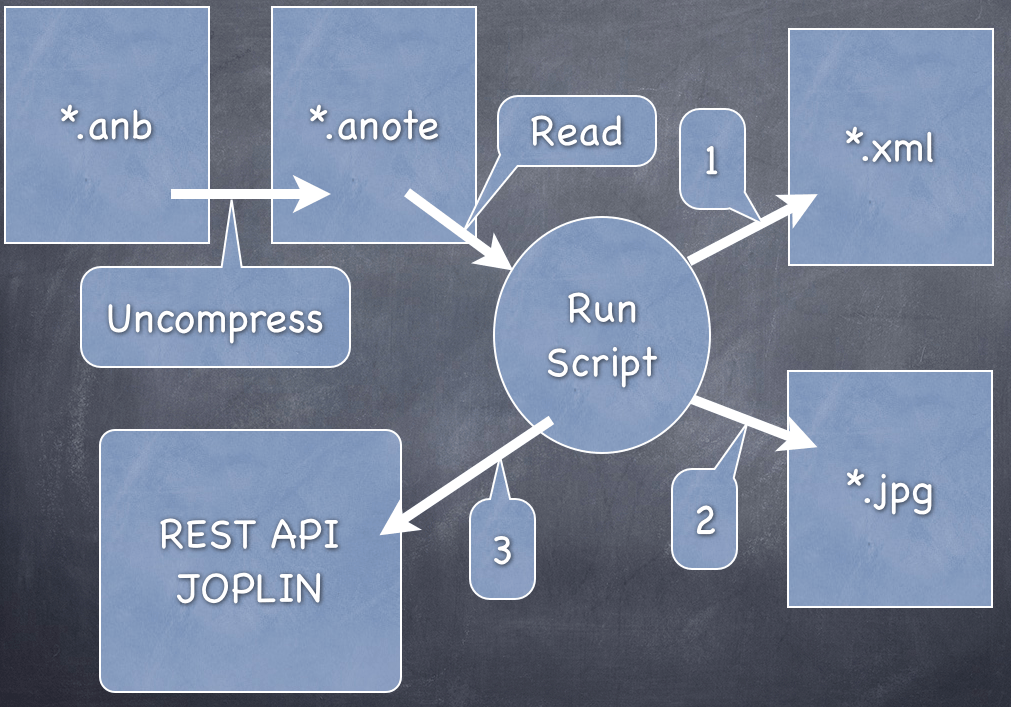Awesome Note 2, it’s very popular on iPad :
The new All-in-one Organizer, Awesome Note 2 is integrated with note and schedule management.
Step 0 : Install Joplin and activate the REST API ( https://joplin.cozic.net/api/ ) .
Step 1 : Install Python.
Step 2 : Create a backup of Awesome Note. ( for exemple : aNote_13Folders_20170520_00_24_21_579Notes.anb )
Step 3 : Uncompress the backup (It’s zip).
Step 4 : Put the script and change Token and name of folder of Backup.
The script :
#
# Version 1
# for Python 3
#
# ARIAS Frederic
# Sorry ... It's difficult for me the python :)
#
import plistlib
import os
import glob
folder = "Put the name of folder"
import requests
import re
import json
from subprocess import Popen, PIPE
import xml.etree.ElementTree
import xml.etree.ElementTree as ET
from xml.dom import minidom
from bpylist import bplist
import base64
###
#IP
ip = "127.0.0.1"
#Port
port = "41184"
#Token
token = "Put the token"
nb_import = 0;
headers = {'Content-type': 'application/json', 'Accept': 'text/plain'}
url_notes = (
"http://"+ip+":"+port+"/notes?"
"token="+token
)
url_folders = (
"http://"+ip+":"+port+"/folders?"
"token="+token
)
url_tags = (
"http://"+ip+":"+port+"/tags?"
"token="+token
)
url_ressources = (
"http://"+ip+":"+port+"/ressources?"
"token="+token
)
#Init
Awesome_UID = "12345678901234567801234567890123"
Awesome_UID_real = ""
payload = {
"id":Awesome_UID,
"title":"Awesome Note Import"
}
try:
resp = requests.post(url_folders, data=json.dumps(payload, separators=(',',':')), headers=headers)
#time.sleep(1)
resp.raise_for_status()
resp_dict = resp.json()
print(resp_dict)
print("My ID")
print(resp_dict['id'])
Awesome_UID_real = resp_dict['id']
save = str(resp_dict['id'])
except requests.exceptions.HTTPError as e:
print("Bad HTTP status code:", e)
except requests.exceptions.RequestException as e:
print("Network error:", e)
###
nb_picture = 0
order = 0
# Convert to XML
files = os.listdir(folder)
for name in files:
if name.endswith('.anote'):
#print(name)
name2 = os.path.splitext(name)[0]
my_file = folder+"/"+name2+".xml"
name = name.replace(" ", "\\ ")
name = name.replace("(", "\\(")
name = name.replace(")", "\\)")
name = name.replace("&", "\\&")
name2 = name2.replace(" ", "\\ ")
name2 = name2.replace("(", "\\(")
name2 = name2.replace(")", "\\)")
name2 = name2.replace("&", "\\&")
#print (name2)
commande = "plutil -convert xml1 "+folder+"/"+name+" -o "+folder+"/"+name2+".xml"
os.system(commande)
my_dict = {}
nb_array = 0
nb_integer = 0
nb_real = 0
nb_string = 0
flag_ok = 0
nb_data = 0
liste_picture = []
my_timestamp = 0
my_title = ""
my_body = ""
my_id = ""
my_picture_name = ""
my_lat = ""
my_long = ""
my_address = ""
for event, elem in ET.iterparse(my_file):
assert event == 'end'
if elem.tag == 'array':
key = elem.text
nb_array += 1;
elif elem.tag == 'key':
value = elem.text
if (value == 'Version'):
flag_ok = 1
#print("ok")
nb_array = 0
nb_integer = 0
nb_real = 0
nb_string = 0
nb_data = 0
elif elem.tag == 'integer':
nb_integer += 1
value = elem.text
elif elem.tag == 'real':
nb_real += 1
value = elem.text
if (flag_ok == 1):
if (nb_real == 1):
my_timestamp = float(value)*1000;
elif elem.tag == 'string':
nb_string += 1
value = elem.text
if (flag_ok == 1):
if (nb_string == 2):
my_key = value
if (value is None):
nb_string += 0
else:
if (value.startswith("Apple")):
nb_string += 1
elif (value.startswith("Times")):
nb_string += 1
else:
split_list = value.split()
if len(split_list) == 3:
my_long, my_lat, my_address = value.split("|")
print("Address",my_long, my_lat, my_address)
if (nb_string == 4):
my_key = value
if (value is None):
nb_string += 0
else:
if (value.startswith("Apple")):
nb_string -= 1
elif (value.startswith("Times")):
nb_string -= 1
if (nb_string == 5):
my_key = value
if (value is None):
nb_string += 0
else:
if (value.startswith("Apple")):
nb_string -= 2
elif (value.startswith("Times")):
nb_string -= 2
if (nb_string == 5):
my_body = value
if (my_body is None):
my_body = ""
else:
my_body = re.sub(r"<@b>", "**", my_body)
my_body = re.sub(r"</@b>", "**", my_body)
my_body = re.sub(r"<@u>", "*", my_body)
my_body = re.sub(r"</@u>", "*", my_body)
if (nb_string == 6):
my_title = value
if (my_title is None):
my_title = ""
elif (len(my_title) == 36 and (' ' not in my_title)):
if (len(my_body) > 0):
my_title = my_body
if (nb_string == 7):
my_id = value
my_id = my_id.replace("-", "")
my_id = my_id[0:31]
elif elem.tag == 'entry':
my_dict[key] = value
key = value = None
elif elem.tag == 'data':
nb_data += 1
value = elem.text
value_clean = re.sub(r" ", "", value)
value_clean = re.sub(r"\t", "", value_clean)
value_clean = re.sub(r"\n", "", value_clean)
nb_picture += 1
my_picture_name = str(nb_picture)+".jpg"
liste_picture.append(my_picture_name)
jpg_recovered = base64.decodestring(value_clean.encode())
g = open(my_picture_name, "wb")
g.write(jpg_recovered)
g.close()
elem.clear()
#print("Data:",my_timestamp,",",my_title,",",my_body)
if (len(my_title) > 150):
print("Error",my_file);
print("Filename:",my_file,"Data:",my_timestamp,",",my_title,",",my_id)
nb_import += 1
payload_note = {
"parent_id":Awesome_UID_real,
"title":my_title,
"source":my_file,
"order":nb_import,
"user_created_time":my_timestamp,
"user_updated_time":my_timestamp,
"author":"Awesome Note",
"body":my_body
}
if (len(my_address) > 0):
payload_note_put = {
"source":my_file,
"longitude":float(my_long),
"latitude":float(my_lat),
"order":nb_import,
"user_created_time":my_timestamp,
"user_updated_time":my_timestamp,
"author":"Awesome Note"
}
else :
payload_note_put = {
"source":my_file,
"order":nb_import,
"user_created_time":my_timestamp,
"user_updated_time":my_timestamp,
"author":"Awesome Note"
}
myuid = my_id
try:
resp = requests.post(url_notes, json=payload_note)
resp.raise_for_status()
resp_dict = resp.json()
print(resp_dict)
myuid= resp_dict['id']
my_id = myuid
except requests.exceptions.HTTPError as e:
print("Bad HTTP status code:", e)
print("payload_note:", payload_note)
except requests.exceptions.RequestException as e:
print("Network error:", e)
url_notes_put = (
"http://"+ip+":"+port+"/notes/"+myuid+"?"
"token="+token
)
try:
resp = requests.put(url_notes_put, json=payload_note_put)
resp.raise_for_status()
resp_dict = resp.json()
print(resp_dict)
except requests.exceptions.HTTPError as e:
print("Bad HTTP status code:", e)
print("payload_note:", payload_note_put)
except requests.exceptions.RequestException as e:
print("Network error:", e)
for my_picture_name in liste_picture:
cmd = "curl -F 'data=@"+my_picture_name+"' -F 'props={\"title\":\""+my_picture_name+"\"}' http://"+ip+":"+port+"/resources?token="+token
print("Command"+cmd)
resp = os.popen(cmd).read()
try:
respj = json.loads(resp)
print(respj['id'])
myuid_picture= respj['id']
except:
print('bad json: ', resp)
my_body = my_body + "\n  \n";
payload_note_put = {
"body":my_body
}
try:
resp = requests.put(url_notes_put, json=payload_note_put)
resp.raise_for_status()
resp_dict = resp.json()
print(resp_dict)
except requests.exceptions.HTTPError as e:
print("Bad HTTP status code:", e)
print("payload_note:", payload_note_put)
except requests.exceptions.RequestException as e:
print("Network error:", e)
With this script you have : Title, Body, Picture, Location. ( No tags but it’s possible, and no folder ). It’s impossible to use plistlib …. sniff.
J’aime ça : J’aime chargement…


